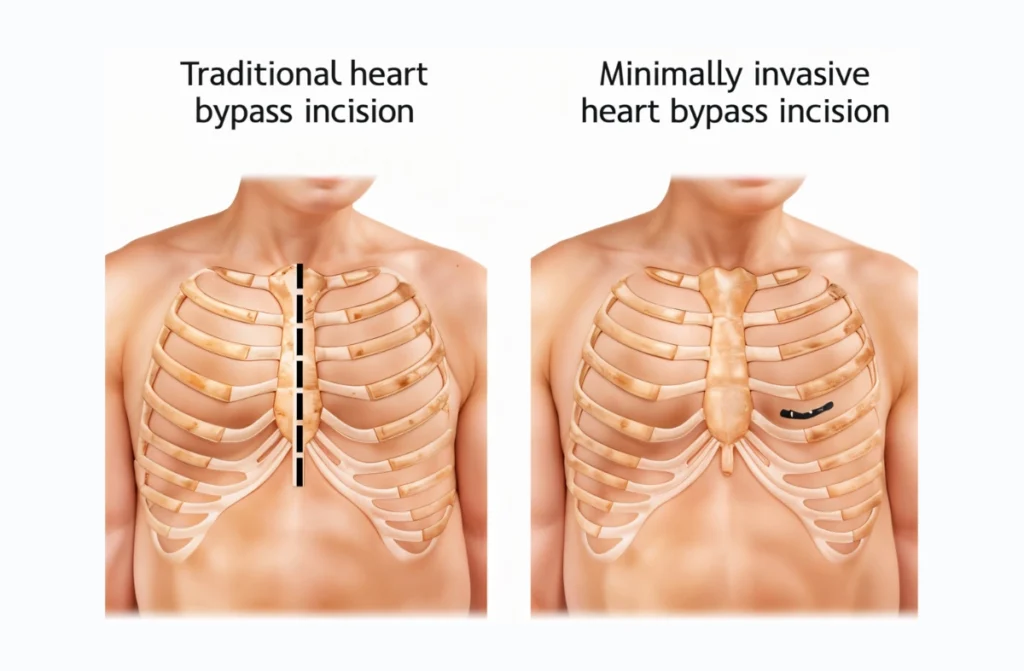Minimal access bypass surgery in Chennai is a minimally invasive cardiac procedure that involves creating new pathways for blood flow around blocked arteries in the heart. This innovative technique reduces the need for traditional open-heart surgery, resulting in smaller incisions, shorter recovery times, and fewer complications, making it a preferred option for many patients seeking heart surgery in the region.
What is Minimal Access Bypass Surgery?
Minimal Access Bypass Surgery in Chennai, commonly known as minimally invasive coronary artery bypass surgery (CABG), is a surgical technique used to treat coronary artery disease, a condition where the blood arteries that supply the cardiac muscle constrict or get clogged.
In this procedure, rather than using traditional open-heart surgery, smaller incisions are made, and specialized instruments are employed to access the blocked arteries. The surgeon then creates new pathways (bypasses) for blood flow, typically using grafts from other blood vessels or arteries in the body.

Causes of Minimal Access Bypass Surgery
Minimal Access Bypass Surgery, also known as minimally invasive bypass surgery, is a surgical technique used to treat coronary artery disease. Unlike traditional open-heart surgery, minimal access bypass surgery in Chennai is performed through small incisions and does not require the chest to be fully opened. The main causes for choosing this approach include:
- Coronary Artery Disease (CAD): The primary reason for minimal access bypass surgery is to treat CAD, a condition where the blood vessels supply the heart muscle with oxygen. This procedure is an option when traditional angioplasty and stent placement are not suitable, or when multiple coronary artery blockages need to be addressed.
- Complex Coronary Artery Disease: Minimal access bypass surgery may be chosen when the patient has complex or multiple blockages in different parts of the coronary arteries. It allows for precise grafting to multiple coronary arteries through smaller incisions.
- High-Risk Patients: Some patients may be at a higher risk for complications associated with traditional open-heart surgery due to factors like age, existing health conditions, or a history of prior surgeries. Minimal access bypass surgery can be a safer alternative for such individuals.
- Desire for Faster Recovery: Minimal access bypass surgery in Chennai is associated with a shorter hospital stay, quicker recovery, and reduced post-operative pain compared to open-heart surgery. Patients may opt for this approach to resume their normal activities more rapidly.
- Cosmetic Concerns: Some patients prefer minimal access surgery due to the smaller incisions, which can result in less scarring and improved cosmetic outcomes.
- Reduced Blood Loss: This technique often leads to less blood loss during the procedure, which can be particularly advantageous for patients with pre-existing anemia or other blood-related issues.
- Avoiding Sternotomy: Minimal access bypass surgery avoids the need for sternotomy, the cutting of the breastbone, which can be associated with discomfort and longer recovery times.
Who is the Right Doctor for Minimal Access Bypass Surgery?
Dr. M. Kathiresan is a well-known and experienced cardiothoracic surgeon specializing in minimal access bypass surgery in Chennai. He would be an appropriate choice for patients seeking this type of procedure. However, it’s essential to consult with your primary care physician or a cardiologist to evaluate your specific medical condition and determine whether minimal access bypass surgery is the right treatment for you.
Treatment for Minimal Access Bypass Surgery in Chennai
Minimal access bypass surgery, also known as minimally invasive coronary artery bypass surgery (MICS CABG), is a surgical procedure used to treat coronary artery disease with smaller incisions and less trauma to the patient than traditional open-heart surgery.
- Preparation: Prior to surgery, the patient undergoes a comprehensive evaluation, including medical history, physical examination, and diagnostic tests such as angiography, to determine the extent and location of blockages in the coronary arteries.
- Anesthesia: The patient is placed under general anaesthesia to ensure they are unconscious and pain-free during the procedure.
- Incisions: Instead of the large incision used in traditional bypass surgery, several small incisions (typically 2-4 inches) are made on the patient’s chest.
Benefits of Minimal Access Bypass Surgery
Minimal Access Bypass Surgery in Chennai, also known as minimally invasive coronary artery bypass surgery (CABG), offers several benefits compared to traditional open-heart surgery:
- Smaller Incisions: Minimal access bypass surgery involves smaller incisions, typically 2-4 small keyhole incisions, as opposed to a large chest incision in traditional CABG. This leads to reduced scarring, less pain, and a quicker recovery.
- Faster Recovery: Patients typically experience a shorter hospital stay and a quicker return to their normal activities. Recovery time can be significantly reduced compared to open-heart surgery.
- Reduced Pain: Smaller incisions and less tissue trauma result in reduced postoperative pain, leading to better patient comfort and overall satisfaction.
Risks of Minimal Access Bypass Surgery
Minimal access bypass surgery, also known as minimally invasive coronary artery bypass (MIDCAB) surgery, is a surgical technique used to treat coronary artery disease with smaller incisions and less tissue disruption compared to traditional open-heart surgery. While it offers several advantages, there are some risks associated with this procedure. Here are some of the potential risks of minimal access bypass surgery:
- Infection: As with any surgical procedure, there is a risk of infection at the incision sites, although this risk is generally lower with minimal access surgery.
- Bleeding: Although minimal access surgery involves smaller incisions, there is still a risk of bleeding during and after the procedure, which may require blood transfusions or other interventions.
- Incomplete Revascularization: Due to the limited access and visualization in minimally invasive techniques, there may be a risk of incomplete revascularization, where not all the necessary coronary arteries are effectively treated.
Conclusion
minimal access bypass surgery in Chennai represents a significant advancement in the field of cardiac surgery. This innovative approach offers numerous benefits, including smaller incisions, reduced trauma, shorter recovery times, and a lower risk of complications compared to traditional open-heart surgery.
While it may not be suitable for all cases, minimal access bypass surgery has revolutionized the way we treat coronary artery disease, providing patients with a safer and more efficient option for improving heart health and quality of life. As technology and techniques continue to evolve, this minimally invasive approach is likely to play an increasingly prominent role in the future of cardiac surgery.


